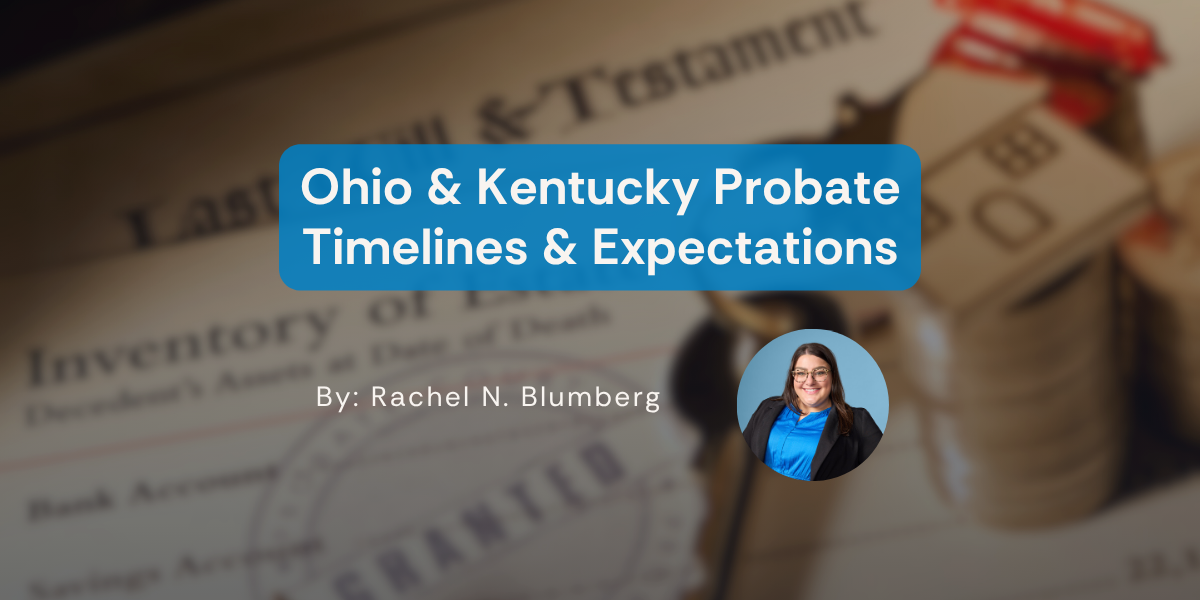Ohio & Kentucky Probate Timelines & Expectations

By: Rachel N. Blumberg
What Is Probate and When Is It Required?
Probate is the legal process for administering and distributing a deceased person's estate under court supervision. Probate ensures that the decedent’s debts are paid, taxes are filed, and any remaining assets are legally distributed to beneficiaries or heirs. If a person dies without a will, the person is deemed to have died “intestate”, and their assets will be legally distributed in accordance with the state distribution laws. If a person dies with a will, the person is deemed to have died in “testate”, and their assets will be distributed according to their wishes while bypassing the state distribution laws. Probate is required for all assets in the decedent’s individual name unless an asset is specifically designated to pass outside of probate such as assets held in joint tenancy with the right of survivorship, a transfer-on-death designation for an asset, or assets held in trust. The probate process in Ohio and Kentucky are generally similar, however, there are some specific nuances with each state and even specific counties within the state. Strauss Troy is familiar and equipped to provide proper guidance to ensure the process is compliant with all state and local laws. This article will provide a bird’s eye view into the probate process while pointing out some of the differences between Ohio and Kentucky.
When to File Probate After Death
In Ohio, there's no specific deadline for filing probate whereas in Kentucky, the probate process must be initiated within ten years of a person’s death. While both states offer ample amount of time, starting the process within 30 to 60 days after death helps to avoid complications with asset management and creditor protection. In Ohio, creditors generally have only six months from the date of death to file any claims against the estate before the claims become barred, whereas, in Kentucky, creditors either have two years from the date of death or six months from the date the administrator/executor is appointed, whichever is earlier.
Probate Timeline
The probate process is structured and includes many legal requirements, steps, and procedures that are outlined in either the Ohio Revised Code or Kentucky Revised Statutes. It is also important to follow the specific local court rules as their procedures may differ from the state. Generally, the key steps in the probate process include:
1. Initial Court Filing – The filing of necessary court forms along with the filing of a will, if any, and the death certificate with the appropriate court.
2. Initial Hearing - The court will appoint an executor (if a will) or an administrator (if no will) for the administration of the estate.
3. Inventory (Asset Security) - Assets are fully documented and secured, often accompanied by professional appraisals.
4. Notice Requirements - Beneficiaries and potential heirs are all informed, and creditor notices are published as required by law.
5. Financial Management - Bank accounts are opened for the estate, and any ongoing expenses and debts are paid.
6. Tax Compliance - Final personal tax returns are filed for the deceased, along with any required tax forms for the estate.
7. Legal Distribution - All assets are distributed according to the state laws, decedent’s wishes (if valid will), and court orders.
How Long Does Probate Take?
The timeline for probate in Kentucky and Ohio depends on many factors but typically can take between six months to a year for basic estates and can last well over a year for more complex estates. Common factors that can cause a drawn-out process include (i) contested wills or disputes among beneficiaries, (ii) missing or incomplete documentation, (iii) poor record-keeping, (iv) creditor claims, (v) difficulty locating beneficiaries, (vi) complex asset valuations, and (vii) tax complications.
Contested wills and disputes among beneficiaries can cause significant delays. Common challenges here include questions about the deceased's mental capacity, claims that another beneficiary exerted undue influence, or disputes over how the will is interpreted. These risks can be minimized through proper preparation which would ideally begin before death with clearly written wills, regular updates, and open communication with the family about estate plans. Professional legal advice during estate planning can avoid many of the common disputes.
The efficiency of the probate process depends heavily on how well organized it is. Executors/administrators should keep detailed records of all transactions, correspondence, and court filings associated with the estate. Developing a structured plan for dealing with filings and communications with beneficiaries will help prevent disputes. All important documents should be gathered as early as possible, including certified copies of death certificates and original copies of wills.
How Strauss Troy Can Support You Through the Process
Dealing with the death of a loved one is stressful. The attorneys at Strauss Troy can help Ohio and Kentucky families relieve some of that stress. Our experienced probate and estate planning attorneys can help guide you through the complex probate requirements and help plan to avoid a drawn-out probate process. Professional legal support guarantees you'll meet deadlines, prepare documents correctly, protect original copies, and help speed up the process in the case complexities or disputes arise. Schedule a consultation today to discuss your specific situation and develop strategies for the efficient administration of your estate or that of a deceased loved one.



